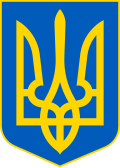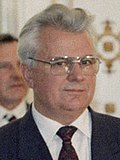| |||||||||||||||||
| Turnout | 70.37% (first round) 71.63% (second round) | ||||||||||||||||
|---|---|---|---|---|---|---|---|---|---|---|---|---|---|---|---|---|---|
| |||||||||||||||||
| |||||||||||||||||
 |
|---|
Early presidential elections were held in Ukraine on 26 June 1994, with a second round on 10 July. [1] [2] They were held ahead of schedule following a compromise between President Leonid Kravchuk and the Verkhovna Rada, the Ukrainian parliament. The elections saw Kravchuk defeated by his former Prime Minister Leonid Kuchma. They were the first presidential elections in the Commonwealth of Independent States in which the incumbent was defeated.
Contents
Kuchma took office on 19 July, marking the first peaceful transfer of power in Ukraine since the fall of Communism.



